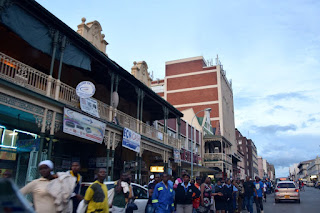 Scores of foreign-owned businesses operating in sectors
reserved for locals under the country’s Indigenisation and Economic Empowerment
Regulations risk losing operating licences after authorities launched a blitz
to unmask the illegal activities.
Scores of foreign-owned businesses operating in sectors
reserved for locals under the country’s Indigenisation and Economic Empowerment
Regulations risk losing operating licences after authorities launched a blitz
to unmask the illegal activities.
Since the beginning of the month, the National
Indigenisation and Economic Empowerment Board (NIEEB) has deployed inspectors
in Harare to verify compliance by businesses operating in reserved sectors,
with further deployments to Gweru and Bulawayo set for this week.
In terms of the Indigenisation and Economic Empowerment
Regulations; businesses in areas such as transport (passenger buses, taxis, car
hire), retail and wholesale, barber shops and salons, grain milling, estate
agents, bakeries, tobacco processing, employment agencies and advertising
agencies; are reserved for locals.
Foreigners who intend to operate in the sectors should
apply for exemption from the responsible line ministry.
NIEEB chief executive Mr Rangu Nyamurundira said operating
within the reserved sector without approval is an offence.
He said: “NIEEB is acting in terms of the Indigenisation
and Economic Empowerment Regulations, which reserve certain sectors of the
economy for Zimbabwean entrepreneurs.
“Section 9A (5) directs NIEEB to verify compliance of
businesses in the reserved sector, including having sight of and making copies
of any relevant documents for purpose of verification.
“Our clearly identifiable officers are now on the ground in
Harare.
“We expect to be starting in Bulawayo and Gweru next (this)
week and the other cities first week of October. Ultimately we must verify compliance across the country.”
Mr Nyamurandira warned the targeted businesses against
obstructing NIEEB officers, saying such actions carry a prison term. He said
the officers would compile reports for onward submission to the parent minister
who can then institute proceedings to revoke operating licences.
Mr Nyamurandira said the exercise has been conducted
annually since 2014.
“The verification exercise will not end. It is an ongoing
exercise because businesses are required to renew their certificates annually
and we are required to undertake periodic verifications to assess the situation
in the reserved sectors,” he said.
“We will also be approaching the relevant licensing
authorities, including local councils, ZIA, Immigration and the Reserve Bank of
Zimbabwe with our findings, including the gross unethical and unlawful business
practices that are in violation of the NIEEB charter and are undermining the
establishment of an empowered society and growth of a new economy.” Sunday mail








0 comments:
Post a Comment